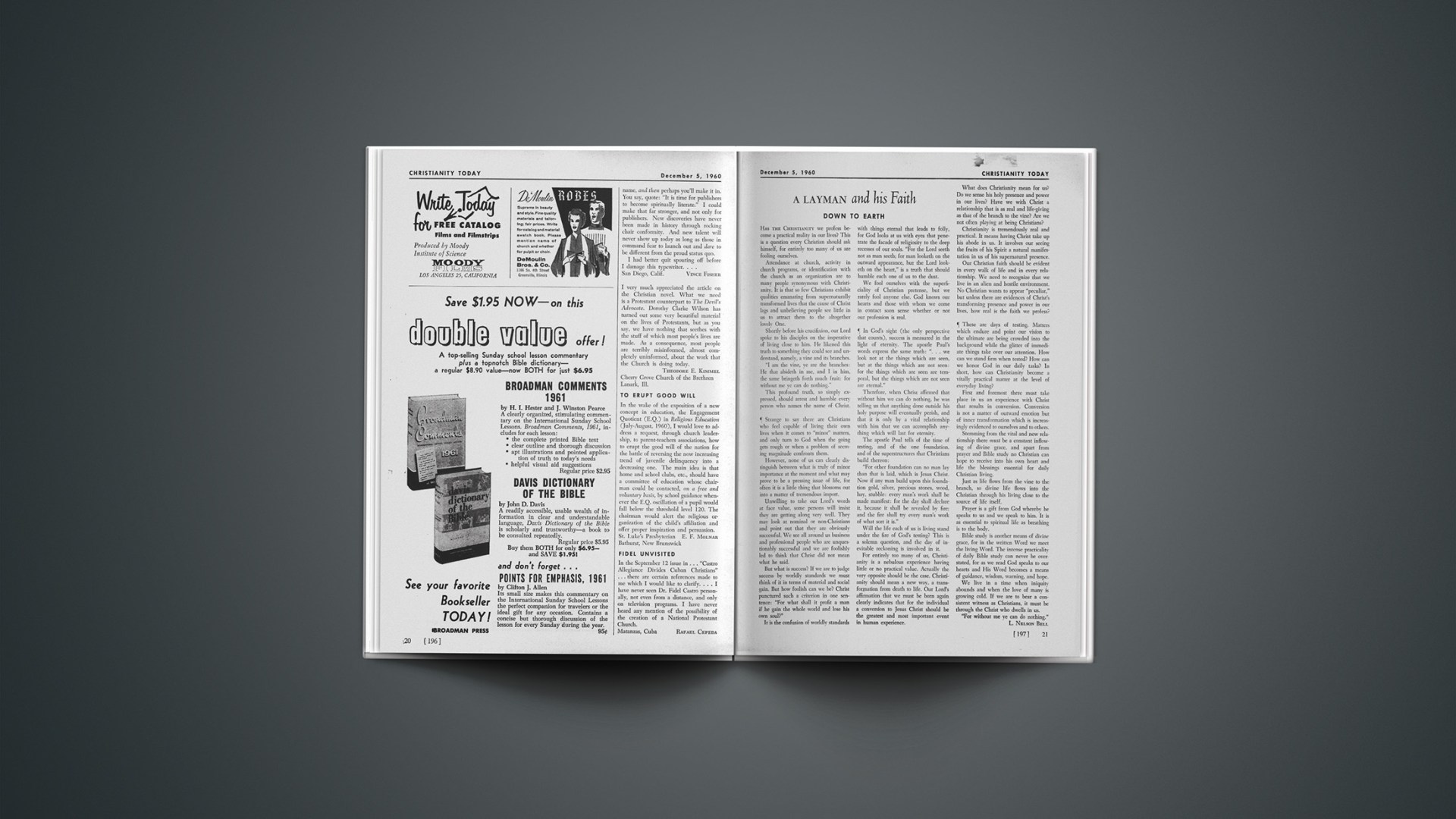DOWN TO EARTH
Has the Christianity we profess become a practical reality in our lives? This is a question every Christian should ask himself, for entirely too many of us are fooling ourselves.
Attendance at church, activity in church programs, or identification with the church as an organization are to many people synonymous with Christianity. It is that so few Christians exhibit qualities emanating from supernaturally transformed lives that the cause of Christ lags and unbelieving people see little in us to attract them to the altogether lovely One.
Shortly before his crucifixion, our Lord spoke to his disciples on the imperative of living close to him. He likened this truth to something they could see and understand, namely, a vine and its branches.
“I am the vine, ye are the branches: He that abideth in me, and I in him, the same bringeth forth much fruit: for without me ye can do nothing.”
This profound truth, so simply expressed, should arrest and humble every person who names the name of Christ.
Strange to say there are Christians who feel capable of living their own lives when it comes to “minor” matters, and only turn to God when the going gets rough or when a problem of seeming magnitude confronts them.
However, none of us can clearly distinguish between what is truly of minor importance at the moment and what may prove to be a pressing issue of life, for often it is a little thing that blossoms out into a matter of tremendous import.
Unwilling to take our Lord’s words at face value, some persons will insist they are getting along very well. They may look at nominal or non-Christians and point out that they are obviously successful. We see all around us business and professional people who are unquestionably successful and we are foolishly led to think that Christ did not mean what he said.
But what is success? If we are to judge success by worldly standards we must think of it in terms of material and social gain. But how foolish can we be? Christ punctured such a criterion in one sentence: “For what shall it profit a man if he gain the whole world and lose his own soul?”
It is the confusion of worldly standards with things eternal that leads to folly, for God looks at us with eyes that penetrate the facade of religiosity to the deep recesses of our souls. “For the Lord seeth not as man seeth; for man looketh on the outward appearance, but the Lord looketh on the heart,” is a truth that should humble each one of us to the dust.
We fool ourselves with the superficiality of Christian pretense, but we rarely fool anyone else. God knows our hearts and those with whom we come in contact soon sense whether or not our profession is real.
In God’s sight (the only perspective that counts), success is measured in the light of eternity. The apostle Paul’s words express the same truth: “… we look not at the things which are seen, but at the things which are not seen: for the things which are seen are temporal, but the things which are not seen are eternal.”
Therefore, when Christ affirmed that without him we can do nothing, he was telling us that anything done outside his holy purpose will eventually perish, and that it is only by a vital relationship with him that we can accomplish anything which will last for eternity.
The apostle Paul tells of the time of testing, and of the one foundation, and of the superstructures that Christians build thereon:
“For other foundation can no man lay than that is laid, which is Jesus Christ. Now if any man build upon this foundation gold, silver, precious stones, wood, hay, stubble: every man’s work shall be made manifest: for the day shall declare it, because it shall be revealed by fire; and the fire shall try every man’s work of what sort it is.”
Will the life each of us is living stand under the fire of God’s testing? This is a solemn question, and the day of inevitable reckoning is involved in it.
For entirely too many of us, Christianity is a nebulous experience having little or no practical value. Actually the very opposite should be the case. Christianity should mean a new way, a transformation from death to life. Our Lord’s affirmation that we must be born again clearly indicates that for the individual a conversion to Jesus Christ should be the greatest and most important event in human experience.
What does Christianity mean for us? Do we sense his holy presence and power in our lives? Have we with Christ a relationship that is as real and life-giving as that of the branch to the vine? Are we not often playing at being Christians?
Christianity is tremendously real and practical. It means having Christ take up his abode in us. It involves our seeing the fruits of his Spirit a natural manifestation in us of his supernatural presence.
Our Christian faith should be evident in every walk of life and in every relationship. We need to recognize that we live in an alien and hostile environment. No Christian wants to appear “peculiar,” but unless there are evidences of Christ’s transforming presence and power in our lives, how real is the faith we profess?
These are days of testing. Matters which endure and point our vision to the ultimate are being crowded into the background while the glitter of immediate things take over our attention. How can we stand firm when tested? How can we honor God in our daily tasks? In short, how can Christianity become a vitally practical matter at the level of everyday living?
First and foremost there must take place in us an experience with Christ that results in conversion. Conversion is not a matter of outward emotion but of inner transformation which is increasingly evidenced to ourselves and to others.
Stemming from the vital and new relationship there must be a constant inflowing of divine grace, and apart from prayer and Bible study no Christian can hope to receive into his own heart and life the blessings essential for daily Christian living.
Just as life flows from the vine to the branch, so divine life flows into the Christian through his living close to the source of life itself.
Prayer is a gift from God whereby he speaks to us and we speak to him. It is as essential to spiritual life as breathing is to the body.
Bible study is another means of divine grace, for in the written Word we meet the living Word. The intense practicality of daily Bible study can never be overstated, for as we read God speaks to our hearts and His Word becomes a means of guidance, wisdom, warning, and hope.
We live in a time when iniquity abounds and when the love of many is growing cold. If we are to bear a consistent witness as Christians, it must be through the Christ who dwells in us.
“For without me ye can do nothing.”
L. NELSON BELL










